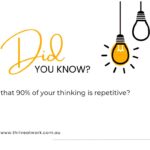Did you know that your brain spends 90% of its thinking time focused on the same set of thoughts?
As in, 90% of our undirected thoughts are repeat thoughts, and only 10% are new thoughts. This is based on studies done in the neuroscience and cognitive psychology fields.
This insight is very surprising to me. I thought I was spending my thinking time on expanding my ideas. But what studies are saying is that the brain likes efficiency and therefore forms neural pathways from past experiences and ingrained patterns that lead to repeated thoughts and behaviours.
Our brains, when not directed to a specific task, have a default mode… of thinking about the past, but of the same past events and for creating visions of the future, but it’s the same future vision on repeat.
When we don’t direct the brain to specific things to think about it goes into automatic thinking. The consequences of automatic thinking include reduced creativity because creativity relies on exploring new perspectives. Another consequence is overthinking things and worrying about potential future events or ruminating on past events, which in turn affects our mental wellbeing.
But surely repetitive thinking is good for building knowledge and cementing habits you say. Yes, indeed it is. However, this happens with awareness. When you’re aware of your thinking, you can direct it to productive activities. However, an idle brain will default to repetitive thinking.
The lesson here is to develop self-awareness so you can redirect your brain from the mindless default thinking it does 90% of the time to the more directed thinking that will lead to knowledge, creativity, habit formation and support positive mental health.
Is that what mindfulness and being mindful is all about?
I wonder!
Come on brain, let’s do some directed thinking, the 10%.


